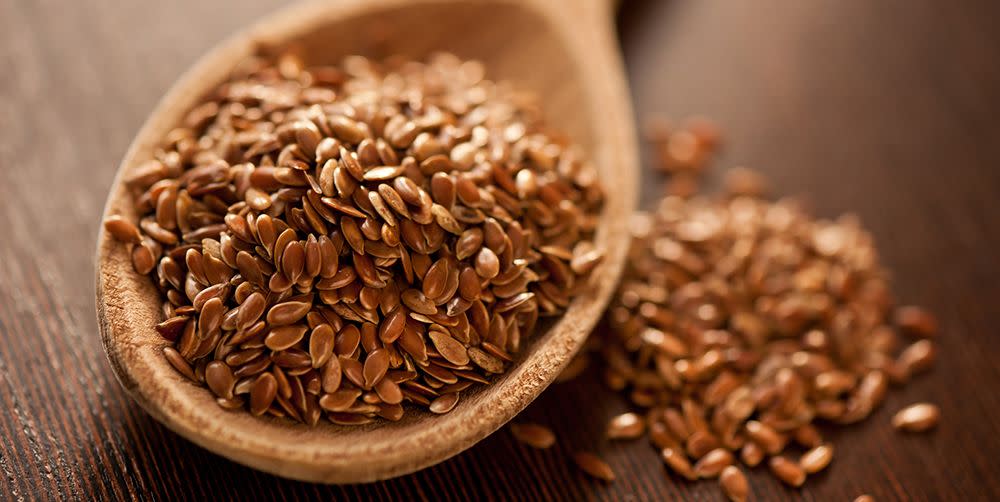Flax Seeds Pack Surprising Nutritional Value—Here’s Why You Should Add Them to Your Diet A.S.A.P.

Most of us have heard of flax seed, at least peripherally. Maybe you saw it in a smoothie at your local juicery, or maybe you’ve seen it in the baking aisle at the grocery store. But how many of us actually know what flaxseed is? Is the “superfood” super-good for you? Or is it another fashionable trend going out of style? The truth is that there are many flax seed health benefits, and potentially a few downsides to adding the “superfood” to your diet as well.
We spoke with dietitian and nutritionist Jackie Newgent R.D.N., C.D.N. to find out more about the health benefits of flaxseed, including how adding flaxseed to your diet can improve your skin and hair health. We also asked the all-important question, which is how much flaxseed should we be consuming daily. Turns out, there can be such a thing as too much flax! But a little bit of the superfood everyday can go a long way.
Flax seed can be easy to use and incorporate into your daily meals, whether you sprinkle it in your healthy smoothies, mix it into your pie crust, include it in your homemade granola, or even add it to your burger patties before firing up the grill. But before you go buying flaxseed in bulk, you should know what’s in it!
Flax seed nutrition facts
One tablespoon (7 grams) of ground flaxseed contains:
Calories: 37
Carbs: 2 grams
Fat: 3 grams
Fiber: 2 grams
Protein: 1.3 grams
Thiamine: 10% of the Daily Value (DV)
Copper: 9% of the DV
Manganese: 8% of the DV
Magnesium: 7% of the DV
Phosphorus: 4% of the DV
Selenium: 3% of the DV
Zinc: 3% of the DV
Vitamin B6: 2% of the DV
Iron: 2% of the DV
Folate: 2% of the DV
Flax seed benefits
Omega-3 fatty acids
Omega- 3 essential fatty acids are “good” fats that have been shown to promote heart health. Studies have also shown that omega-3s may help reduce inflammation and prevent cholesterol from being deposited in your heart’s blood vessels. Each tablespoon of ground flaxseed contains about 1.8 grams of plant omega-3s.
Lignans
Lignans are a type of phytoestrogen, a group of compounds that are linked to a reduced risk of developing osteoporosis, heart disease and breast cancer. Lignans also have antioxidant properties, meaning they protect your cells from damage. Flax seed happens to boast 75–800 times more lignans than other plant foods!
Fiber
Flax is an excellent source of soluble fiber, which absorbs water and slows down digestion. Soluble fiber can help lower cholesterol, stabilize blood sugar levels, and lower the risk of heart disease. Just 1 tablespoon of ground flaxseed packs 2 grams of fiber, which is around 5% and 8% of the daily recommended intake for men and women, respectively.
Benefits for Skin and Hair
A popular question surrounding flaxseed is if it shows benefits for both skin and hair health. Nutritionist Jackie Newgent says that the best way to boost your skin and hair health is “to make sure your body is getting all essential nutrients, including fatty acids, vitamins and minerals, carotenoids, and polyphenols.” Because flax seeds are rich in Omega-3 fatty acids, consuming them can help maintain the health of your skin.
Research has found that women with sensitive skin may experience skin improvement by incorporating flax oil in their diet. Additionally, research has supported the positive effects that flaxseeds have on aging skin because of their anti-inflammatory benefits. When it comes to your hair, nutrition expert Newgent shared that “flaxseeds also offer B vitamins, which are associated with maintaining healthy hair.” So maybe she’s born with it, or maybe it’s the magic of flax seeds!
Whole vs. Ground vs. Oil: Which is best?
So now that you know all the benefits, what’s the best way to integrate flax into our diets?
When flaxseed is eaten whole, it is more likely to pass through the intestinal tract undigested, meaning that your body won’t get all the healthy components. If you decide to go the oil route, flax oil is full of fatty acids, but it lacks the fiber boost of flaxseed. Therefore, flax oil is a convenient way to get more omega-3s into your diet, but it won’t give you all the same benefits of ground flax. The best way to make sure that your body is taking advantage of all the beneficial components of flax is to go with the ground!
It’s also important to note that “since they contain potentially toxic compounds, it’s recommended to avoid eating raw or unripe flaxseeds,” says Newgent.
How much flaxseed should I add to my diet?
According to the experts, Newgent says “for adults, enjoying 2 tablespoons of seeds, such as flaxseeds, daily is advisable for good health.” So when it comes to flax, a little goes a long way.
Flax seed side effects
Although there are many health benefits to flax seed consumption, there are also a few drawbacks to consider.
For one, ground flaxseed is high in fiber, with 2 grams packed into each tablespoon. While fiber is beneficial, increasing your intake very quickly can lead to digestive issues, including gas and bloating. Always be sure to drink plenty of water with your flax seed!
Medical professionals also advise to exercise caution if you are pregnant or breastfeeding. Newgent shared that “when pregnant, it may be unsafe to consume flaxseeds since they have a slight effect on hormone levels. If breastfeeding, talk to your doctor or dietitian about the use of flaxseeds.”
It’s also a good idea to discuss adding flaxseed to your diet with a doctor if you have kidney disease or other problems that affect potassium levels, since flax is high in potassium. You should also ask your doctor first if you have hormone-related cancers, such as ovarian or breast cancer, since flax contains phytoestrogens.
You Might Also Like

